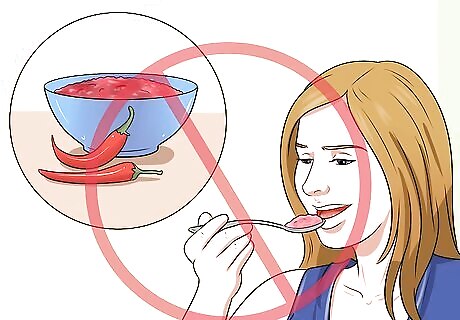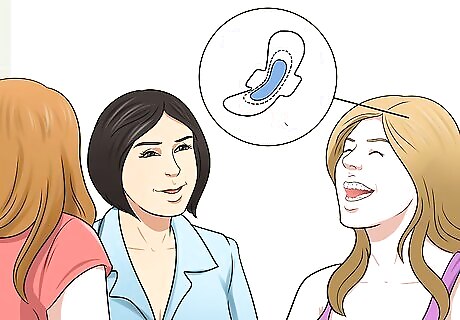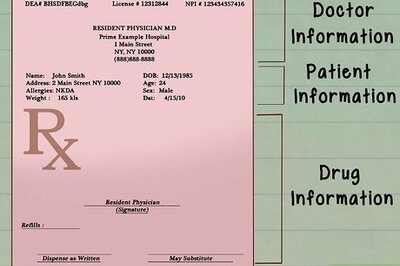
views
Using Foods to Start Your Cycle

Eat spicy foods twice a day in the 2 weeks before your period. If you want to get your period early, try eating spicy foods one to two times a day. You will need to start two weeks before your period is due to begin. Some people claim that it will heat up your body, allowing menstruation to begin early, but there is no convincing medical evidence to back it up.

Drink pomegranate juice 3 times a day to start your period. High in antioxidants, some women claim that it can help bring on a menstrual period. Drink it three times a day, starting two days before you want your period to begin.

Eat carrots, pumpkins, or papaya to get more carotene. High in carotene, pumpkins, papaya, and carrots — either raw or juiced — may help bring on a period. Drink carrot juice or eat one to two carrots, a serving of pumpkin or papaya three times a day two days before you want your period to begin.

Consume pineapple to help start your period early. Like spicy food, pineapple is thought by some to help jolt your body into starting your period early. Drink two 12-oz glasses of pineapple daily, or eat that same amount daily.

Drink sesame seed or turmeric tea starting 15 days before your period. With sesame seeds, mix two teaspoons with hot water and drink twice a day. Turmeric tea is made with a teaspoon of turmeric in boiling water, and is also supposed to be drunk twice a day. For both, start 15 days before your period should begin.
Postponing Your Cycle

Avoid spicy foods because they raise your body temperature. Steer clear of hot peppers, ginger, garlic, chili, paprika and other spices that raise your body's temperature. Eat bland foods for the weeks leading up to your period. Some women claim that this can help postpone your period because your body temperature isn't being elevated by the food, but there is no medical research to back this up.

Eat fried lentil soup or dal once a day for at least a week. A traditional home remedy, it's not clear why it might work — but many women say that it does. You should eat it on an empty stomach, at least once a day for a week prior to when your cycle would normally begin.

Drink parsley tea 3 times a day for at least 2 weeks. Boil a bunch of parsley in 16 oz of water for 20 minutes. Strain the liquid and add honey. Consume it two to three times per day, 15 days before your period is set to begin.

Try drinking apple cider vinegar 3 times a day. Add a tablespoon of apple cider vinegar to an 8-oz glass of water. Start drinking three times a day at least three days before your period is set to begin. Again, remember that none of these remedies are backed up with scientific evidence.

Lengthen and intensify your workouts to boost progesterone. When you are habitually exercising, your levels of progesterone, a hormone known to inhibit menstrual bleeding, are elevated. Do strenuous activities like running, swimming, weight-lifting, or aerobics. If you are already engaged in some form of exercise, increase the intensity. If you are physically inactive, try a progressive exercise program to safely ease yourself into an exercise routine.

Be aware of how stress affects your period. This is not a suggestion to seek out more stress in your life — it is an observation that often one traumatic event will postpone or even prevent a normal menstrual cycle. Mental and emotional stress tend to put our bodies on alert, and your body will deal with the stress rather than creating your normal menstrual period.
Regulating Your Cycle

Sleep with a light on for 3 nights to help make your cycle regular. Try sleeping in total darkness for all but three nights of your cycle. During those three nights, have a light on in the adjoining room to mimic moonlight. According to some, these three nights of light then trigger ovulation, allowing your body to get onto a regular menstrual cycle. Some women have found this to be very effective, but there is no research other than personal stories to support it.

Spend more time with women who are menstruating. It is theorized that the pheromones their bodies release can affect your cycle and trigger your body to menstruate earlier or later. Groups of women living together for months at a time may overlap on their cycles if their cycles last for a similar number of days. Scientific studies have partially debunked this claim, but many women still swear by it.

De-stress to maintain a positive hormonal balance. Stress disrupts the hormonal activity that initiates and sustains your menstrual cycle. Identify the source of the stress and from there you can reduce stress.
When to Seek Medical Care

See your doctor if your period stops or becomes erratic. While it's normal for your period cycle to change sometimes, it's best to talk to your doctor when this happens. Sometimes changes in your cycle can mean something is wrong. Tell your doctor if you haven't had a period in several months or your cycle length changes often. If you're sexually active, a stopped period may mean you're pregnant. However, it could also mean that you have an underlying medical condition or are very stressed. If your periods are sporadic, it may mean you have an underlying condition that needs treatment.
Visit your doctor for very long or heavy periods. Your period shouldn't last longer than 7 days, and it shouldn't be so heavy that you soak through more than 1 pad or tampon in 1-2 hours. When this happens, it may be a cause for concern. Your doctor can figure out what's causing your long or heavy periods so you can find relief. Keep in mind that you might lose a lot of blood at one time if your period is too long or too heavy. It's important to make sure you're okay.
Talk to your doctor if your period cycle isn't between 21-35 days long. Cycles that are shorter than 21 days or longer than 35 days may mean something is wrong. However, try not to worry because you may just have an irregular cycle. Visit your doctor to make sure that everything is okay and to find out if you need additional treatments. Your period cycle may occasionally change due to stress, weight loss, exercise, or certain health conditions. However, persistent changes may mean you need treatment.
Check with your doctor if you bleed between periods. Spotting between periods can be normal, but it may also mean that something is wrong. To be sure, talk to your doctor to find out what's causing your spotting. Then, ask them about your treatment options. You may not need any treatment. However, it's best to make sure everything is okay.
Talk to your doctor about using birth control to regulate your period. If you have irregular periods, you may be able to take oral hormonal birth control to keep your periods regular. Additionally, the birth control will help you manage your PMS symptoms. Ask your doctor if this treatment may be right for you. You have several options when it comes to birth control, so you can find the one that works for you.
Talk to your doctor about bioidentical hormones. These are hormones that are made to be molecularly identical to the hormones made in a woman's body, though they are instead synthesized from soy and yams. They are often taken to treat menopausal symptoms but may also help with things like PMS, fibroids, and regulating your period. Talk to your doctor about options for FDA-approved bioidentical drugs and the potential side effects. Be aware that over-the-counter plant-derived progesterone creams and yam extract creams do not work the same, as they either have too little of the hormone to be effective or cannot be synthesized by the body and converted into progesterone. Products that are not FDA-approved are not regulated, meaning there is no way to verify that they actually contain what they claim on the bottle. More research still needs to be done on bioidentical drugs and the long-term risks.




















Comments
0 comment